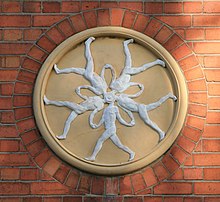Humber (car)

Beeston
one of the plaques on the works building |
|
| Industry | Automotive industry |
|---|---|
| Fate | 60% control purchased by Rootes Group 1932 |
| Successor | Chrysler |
| Founded | 1887 |
| Founder | Thomas Humber |
| Defunct | 1967 |
| Headquarters | Coventry, England |
|
Key people
|
William Rootes Reginald Rootes |
| Products | Bicycles Motorcycles Automobiles |
| Subsidiaries | see text |
 |
|
| Owner | PSA |
|---|---|
| Country | United Kingdom |
| Discontinued | 1976 |
| Markets | Automotive Bicycles Motorcycles |
| Previous owners | 1868–1932 Private investors 1932–1967 Rootes Group companies 1967–1979 Chrysler |
Humber Limited was a British manufacturer of bicycles, motorcycles and motor vehicles incorporated and listed on the stock exchange in 1887. It took the name Humber & Co Limited because of the high reputation of the products of one of the constituent businesses that had belonged to Thomas Humber. A financial reconstruction in 1899 transferred its business to Humber Limited.
From an interest in motor vehicles beginning in 1896, the motor division became much more important than the cycle division and the cycle trade marks were sold to Raleigh in 1932. The motorcycles were withdrawn from sale during the depression of the 1930s.
Humber is now a dormant marque for automobiles as well as cycles. Following their involvement in Humber through Hillman in 1928 the Rootes brothers acquired 60 per cent of Humber's ordinary capital, sufficient for a controlling interest. The two Rootes brothers joined the Humber board in 1932 and began to make Humber the holding company for vehicle manufacturing members of what became their Rootes Group.
By 1960 annual production was around 200,000 vehicles. Previous insistence on Rootes family control, however, may have led to under-capitalisation of the business. Building a brand new car, the Hillman Imp, proved beyond Humber and Rootes Group resources and their businesses were bought by the Chrysler Corporation in 1967.
The cycle industry was consolidating in the late1880s and partners Thomas Humber and fledgling company promoter T Harrison Lambert sold their Humber Cycles business to investors who added a number of other substantial cycle manufacturers and then floated the new combine on the stock exchange. Such was the public's recognition of Humber products and their high quality and reliability the whole new organisation was named Humber & Co Limited though Humber's was not the largest component. Thomas Humber agreed to manage the whole enterprise with its works in Coventry and Wolverhampton as well as Beeston. He retired in 1892 at the end of his 5-year contract.
Humber expanded into Europe and in 1896 their subsidiary, Humber (France), joined with La Société des Vélocipedes Clément and La Société des Cycles Gladiator obtaining stock exchange listings in order to form "one of the largest Cycle monopolies in Europe" and with the intention of improving the position of Humber (France). The directors expressed the greatest interest in the new industry of motor carriages and cycles for which extensive works were to be erected by the monopoly at Levallois Perret. At the time of the flotation prospective investors were told that agencies were already established in all principal towns in France, and the cities: St Petersburg, Copenhagen, Milan, Athens, Brussels, Bucharest, Amsterdam, Lisbon, Buenos Ayres, Santiago, Constantinople, Algiers, Sfax, Tunis, Alexandria, Saigon, Hong Kong, Port Said and throughout the whole of South America. The chairman of the new monopoly was chairman of Dunlop Pneumatic Tyre Co and another director was the manager of Dunlop (France). Negotiations between the parties were completed by Ernest Terah Hooley.
...
Wikipedia
